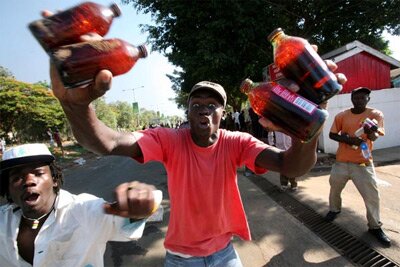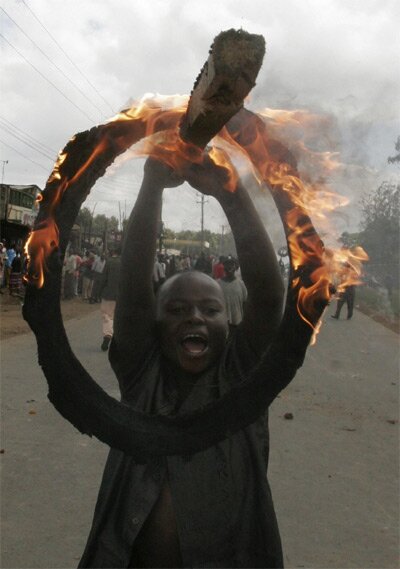South Africa’s Neville Chamberlain
UPDATE: Thanks to the Watcher’s Council for awarding this post the top council post of the week 6/27/2008. I humbly appreciate the honor considering the quality of posts the council produces every week. – SK
Thabo Mbeki has sat silently while his country is flooded with refugees fleeing the economic and social collapse of South Africa’s northern neighbor Zimbabwe. Robert Mugabe, Zimbabwe’s liberator turned oppressor lost the parliamentary elections held in March, then scrambled his thugs to action to make sure that his loss wouldn’t be repeated in the run-off to be held Friday. While international pressure against Mugabe mounted, Mbeki resisted joining the chorus of condemnation and use the leverage his nation has over Zimbabwe to get Comrade Bob to relinquish power. Instead Mbeki pursued a “soft-softly” conciliatory approach, telling the rest of the world, in particular the US and the UK, to but out of what he considered to be an “internal matter.”
But Mbeki’s soft-softly approach has failed spectacularly as the Guardian notes:
“Mbeki has fundamentally misread the situation in Zimbabwe; the political advice and intelligence reports he has been given is appalling,” said (Piers Pigou, director of the South Africa History Archive), who called the quiet diplomacy policy “a remarkable example of how to mess something up”. “He [Mbeki] overestimated his influence over Mugabe and Zanu-PF, thinking that his politics of appeasement would be reciprocated by concessions from them. It wasn’t.”
Ray Hartley, editor of the Times of South Africa, is furious with Mbeki’s approach:
Regional leaders and South Africa’s President Thabo Mbeki, in particular, have failed to act against Mugabe even as evidence of the torture, murder and mutilation of opposition campaigners has mounted. They have not raised a finger to stop brazen election rigging and what now amounts to the theft of the run-off election by Mugabe’s thugs.
...
Mbeki’s flaccid diplomatic has failed utterly and yet, like a man who believes he can press reality into assuming his likeness, he persists with this weak initiative.
What is needed now is action against the Mugabe regime.
The Mark Bellamy and Stephen Morrison writing in the Washington Post call Mbeki “quietly complicit for enabling Mugabe’s misrule,” while the Post itself in an editorial blamed Mbeki for preventing Zimbabwe’s neighbors or the UN from intervening to stem the catastrophe that has driven 3,000,000 Zimbabweans to flee their own country.
The big question is why Mbeki has taken this approach. Piers Pigou believes the natural friendship between liberation movements is overblown. Liesl Louw, associate editor at the Institute for Security Studies in Pretoria South Africa, ponders the question as well.
Surely Mbeki, who has successfully run the largest economy in sub-Sahara Africa and mediated in crises in Burundi or the Democratic Republic of the Congo, would not support a man who has driven his country to economic collapse? The collapse has caused millions of Zimbabweans to stream across the border. It has also cost the South African economy billions in loss of export revenue.
Perhaps Mbeki’s problem has nothing to do with western pressure or liberation comradeship even though he has stated that Zimbabwe’s problems are “an internal matter” – odd coming from a man who worked to make aparteid an international cause in the late 1970’s. Reading his background Mbeki has been involved in some pretty tough negotiations, but that may be the problem.
Mbeki is a diplomat. In 1985 he negotiated as a member of the ANC with South African businesses. In 1989 he led talks with the South African government that led to the banning of the ANC and the release of political prisoners including Nelson Mandela.
Diplomats are by nature incapable of making decisions. Decisions are left to leaders who set goals for talks and approve or decline compromises. Diplomats function well when two sides are willing to give up something, but are useless when one side refuses to give up anything at all.
And that’s exactly what Mugabe has done in Zimbabwe. By turning a nation into his own personal estate, he sees nothing to gain by leaving power. He pried it from the hands of the white colonialists. He alone has ruled it in the thirty years since. In his mind Zimbabwe is his. Why should he negotiate? He already has what he wants.
To call Thabo Mbeki South Africa’s Neville Chamberlain would risk using a cliche if it weren’t for the fact that both men were diplomats and both failed to recognize that one party was not willing to give up anything or compromise in the least. A leader will recognize and walk away from a negotiating table the minute he senses that the other party has nothing to offer; not so a diplomat. A diplomat will always believe that he alone can pull success out of any negotiation if given enough time and effort.
Robert Mugabe is a leader. He will not let a diplomat pry his property from his own hands, even if in the process he is strangling that property to death. Thabo Mbeki is a diplomat who is incapable of stopping him.
I always believed that Thabo Mbeki was incapable of filling the shoes of another leader whom he served, Nelson Mandela, but later reconsidered and thought that maybe South Africa needed a diplomat to keep the peace between divergent power centers in the land. While Mbeki has been successful in that diplomatic role, he has completely failed his international role as a leader of post-colonial Africa. The people of the region need a leader to step up and recognize that the time for talk is over and the suffering must end. Unfortunately for them Thabo Mbeki is not that leader.
NOTE: I also would like to thank Zach Barbera for his excellent commentary on Zimbabwe around the time that confiscation of land began occurring in 2002. It has stood the test of time for being prescient as well as some of the best writing on Mugabe and the nation he has pillaged over the years. I don’t know where you are, Zach, but thanks!
Liberal Enablers of Mugabe here.





